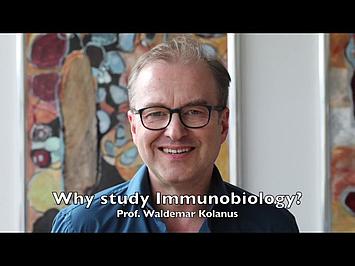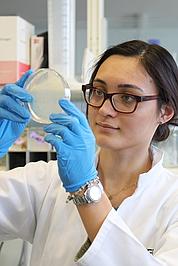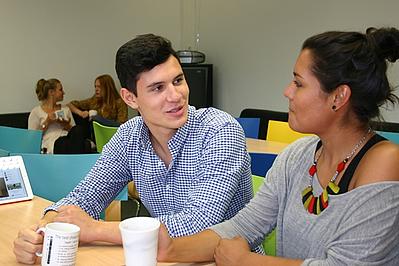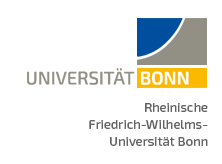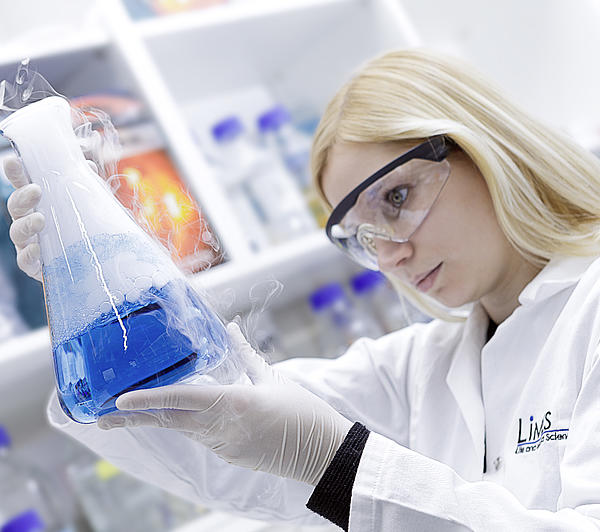Molecular mechanisms regulating the immune system are still poorly understood
Current developments in immunology show that molecular mechanisms regulating the immune system are still poorly understood. Additionally, it is becoming clear that a system-biological approach including bioinformatical analysis of transcriptomes and epigenetic alterations in single immune cells is indispensable to understanding immunological processes. Therefore, there is a substantial need for natural scientists with a thorough education in systems biology. To accommodate this need, the LIMES institute offers the Master in Immunobiology - From Molecules to Integrative Systems. Students will be offered a profound education in immunology and systems biology. An in-depth understanding of the molecular and structural processes of the immune system combined with substantial knowledge and hands-on training in systems biology will be imparted.
The Master's program comprises lectures, practical courses, workshops, excursions, and independent research projects. It is an interdisciplinary hands-on training program that prepares students to solve scientific problems independently.
Title/Degree: Master of Science in Immunobiology
Duration: 2 years (120 CP), full-time
Start: Winter semester (October)
Study places: 25
Language of instruction: English
Social fee: currently 309,91 EUR per semester (including free public transportation in the region)
Course contents
The Master’s program "Immunobiology: from molecules to integrative systems" is organized by the Life & Medical Sciences Institute (LIMES), an internationally oriented center for biomedical research and higher education at the University of Bonn. An important scientific focus of the institute is to explore the regulation of the immune system in health and disease, and to decipher signaling processes in the lipid metabolism and in biomembranes.
Research on the immune system is the key to understand the molecular basis of many diseases. These obviously include bacterial and viral infections, but we now know that the immune system controls and influences the course of other common diseases, e. g. cancer, Alzheimers’, as well as cardiovascular and metabolic syndromes.
Modern Immunology aims at understanding the functions of our key defense mechanisms against pathogens at the level of molecules or even atoms- but furthermore it is a real systems science: an immune reaction and its consequences can only be understood in the context of intact organs in a living organism, yet we need high-end in vitro approaches including imaging and biochemistry to fully understand the underlying pathways at the molecular level.
Our choice of topics in the new Master’s program "Immunobiology: from molecules to integrative systems" offers an attractive package for educating you into a modern, complete immunologist and systems scientist, ready for tackling the challenges of the future. We will get you acquainted with model organisms and in vitro approaches for the study of the immune system and of its important cells. You will learn about intracellular signaling pathways, by directly visualizing molecules in living cells, and by isolating the corresponding protein complexes. Finally you’ll embark on systems approaches using functional genomics, epigenetics and sophisticated bioinformatics to understand the complex regulation and communication in the immune system. You'll learn how it is smartly operating as a whole – and what can go wrong in disease.
Immunological research has never been more timely: Study at LIMES to become a comprehensively educated immunologist and be ready for a fascinating scientific career in academics or in industry!
Thematic focuses
The Master's program Immunobiology - From Molecules to Integrative Systems combines an in-depth education in immunology with systems biology, including crucial aspects such as genomics and epigenetics and their analysis using bioinformatics. The program is research-oriented and is taught completely in English. Apart from an in-depth education of scientific knowledge in the mentioned areas, it is characterized by a high proportion of individual research projects in which students are integrated at an early stage into the highly competitive and interdisciplinary research groups of the LIMES institute. Alternatively, all students have the possibility to perform such research projects in other universities or abroad during the course of their Master's studies. Additionally, students are trained in a large variety of methods and techniques applied in life sciences and gain first contact with representatives of life science industries. Finally, a mentoring system helps the students to study efficiently, to plan their career in a more focused manner, and to become independent.
Job prospects
The primary goal of our study programs is to provide students with an excellent background in basic biomedical research and to prepare them for a master's degree or doctorate.
Activities can be carried out later in academic or industrial environments (universities, non-university research facilities, industry research departments, etc.).
Typical occupational fields are:
- in research at the university, at a clinic, at a research institute or in industry
- in project management
- in science journalism
- as a lecturer in teaching
Admission requirements
The principal admission requirement for the MSc program is a Bachelor's degree (or equivalent) in Molecular Biomedicine, Immunology, Biology, Molecular Biology, Biochemistry, Bioinformatics or a related field. Applicants must have conducted an experimental Bachelor's thesis or a thesis in the field of Bioinformatics.
All courses are held in English. Applicants who are not native speakers of English should demonstrate adequate competence of the English language by acceptable results on an internationally recognised test. Minimum language requirements are met by achieving the following test scores:
- TOEFL paper-based test: 550
- TOEFL computer-based test: 213
- TOEFL Internet-based test: 87-109
- IELTS: 6.0
In addition, the certificates APIEL and CPE meet the requirements of English proficiency. Applicants who took English courses at a German "Gymnasium" until their final examinations (Abitur) or wrote their Bachelor's thesis in English do not need the above mentioned tests. Admission to the graduate school involves a selection procedure.
Tuition fees
No tuition fees. Students must pay a social fee of approx. 285,11 EUR per semester ("Sozialbeitrag") to the Student Union, which is used to support student activities and provides free public transport in the state of North Rhine-Westphalia.

